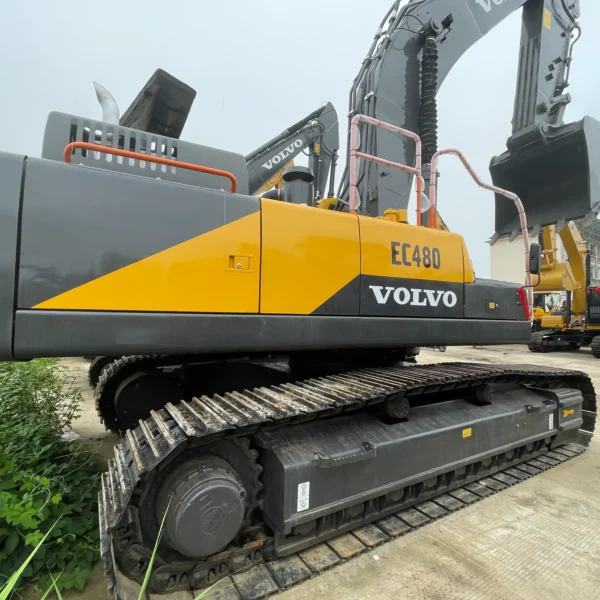In the construction industry, selecting the right type of excavator equipment is crucial for achieving optimal efficiency and results. Two of the most popular types of excavators are wheeled excavators and crawler excavators. Each offers its own unique set of advantages, depending on the type of construction project you’re tackling. Whether you’re involved in urban construction, demolition, landscaping, or roadwork, understanding the key differences between these two types of excavators will help you make an informed decision for your business.
In this article, we’ll dive deep into the characteristics, advantages, and applications of wheeled excavators versus crawler excavators, and help you determine which is the best option for your specific project needs. We will also examine the cost-effectiveness of choosing a used excavator, with a focus on the long-term benefits of purchasing second-hand equipment.
What Are Wheeled Excavators?
Wheeled excavators are characterized by their rubber tires, which allow for greater mobility on flat, solid surfaces like asphalt or concrete. These excavators are ideal for projects that require frequent movement between different job sites, especially in urban environments where the ground conditions are firm, and space is limited.
Key Features of Wheeled Excavators:
High Mobility: Due to their tires, wheeled excavators can travel quickly between job sites, making them ideal for urban construction and roadworks.
Faster Transportation: Wheeled machines don’t require the use of a trailer for transportation, saving both time and money on logistics.
Stability on Hard Surfaces: Wheeled excavators offer excellent stability on firm ground, making them ideal for tasks like material handling, digging, and grading on roads and parking lots.
Applications for Wheeled Excavators:
Urban Construction: Due to their high mobility, wheeled excavators are excellent for working in crowded urban areas where space is tight.
Roadworks: These excavators are designed to handle asphalt, gravel, and other hard surfaces, making them perfect for road construction projects.
Landscaping: Wheeled excavators are ideal for projects where quick movement and high flexibility are required, such as landscaping, tree removal, and site preparation.

What Are Crawler Excavators?
Crawler excavators, on the other hand, are equipped with tracks (also known as crawlers), which give them exceptional stability and traction. This makes them ideal for jobs that require working on rough or uneven ground, such as construction sites with soft soil, mud, or sloped terrain. Crawler excavators can work in conditions where wheeled excavators may struggle.
Key Features of Crawler Excavators:
Superior Stability: The tracks offer better stability, especially when working on uneven or soft ground. This makes crawler excavators perfect for heavy-duty tasks such as digging in unstable soils or performing landfill operations.
Greater Traction: Crawler excavators provide excellent traction, which is crucial for demolition and heavy lifting tasks in difficult environments.
Reduced Ground Pressure: The tracks distribute the weight of the excavator more evenly, reducing the ground pressure and preventing the machine from sinking into soft terrain.
Applications for Crawler Excavators:
Construction on Rough Terrain: Crawler excavators are the go-to choice for construction jobs in rugged, off-road environments like mountainous regions, landfills, or swampy areas.
Demolition: With their superior stability and traction, crawler excavators are excellent for handling the rough conditions associated with demolition work, whether it’s breaking down buildings or clearing debris.
Mining and Quarrying: The ability to perform heavy lifting on uneven ground makes crawler excavators ideal for mining and quarrying tasks, where stability is paramount.

Wheeled Excavators vs. Crawler Excavators: Pros and Cons
Now that we’ve covered the basics of each type of excavator, let’s compare the wheeled and crawler versions in more detail to help you decide which is better suited for your specific project requirements.
- Mobility and Speed
Wheeled Excavators: Wheeled excavators are more mobile and faster when traveling between job sites. The ability to drive on hard surfaces without a trailer means that you can get to the next job site quickly, minimizing downtime.
Crawler Excavators: While crawler excavators are slower, their track systems are designed for stability rather than speed. They are perfect for working on uneven terrain but require additional effort to move between sites, often needing a transport vehicle.
- Stability
Wheeled Excavators: Wheeled excavators perform well on flat, solid ground. However, their stability is compromised on soft or uneven surfaces, which can cause them to sink or get stuck in challenging conditions.
Crawler Excavators: Crawler excavators excel in terms of stability, especially on soft or rough ground. They are the preferred choice for projects where the ground is uneven, muddy, or soft, such as in land clearing or demolition on undeveloped land.
- Fuel Efficiency
Wheeled Excavators: Wheeled excavators tend to consume more fuel, especially when used on rough terrain or for extended periods of time. However, their fuel efficiency improves when used on hard surfaces with less resistance.
Crawler Excavators: Crawler excavators are generally more fuel-efficient when working on heavy-duty tasks such as excavation in soft soil, as they distribute weight evenly across the tracks, reducing wear and tear on the engine.
- Cost
Wheeled Excavators: Generally, wheeled excavators are less expensive than crawler excavators when purchased new. Additionally, used wheeled excavators can provide significant savings while offering excellent performance for projects in urban areas or on hard surfaces.
Crawler Excavators: Although crawler excavators are typically more expensive upfront, their superior performance in rough conditions can lead to long-term savings on repair costs and the need for fewer maintenance interventions.
- Maintenance and Longevity
Wheeled Excavators: Wheeled excavators generally have lower maintenance costs than their crawler counterparts. However, their tires wear down over time, especially when used on rough ground, leading to higher maintenance and replacement costs.
Crawler Excavators: Crawler excavators require more frequent maintenance due to the wear and tear of the track system and hydraulic components. However, with proper care, crawler excavators can outlast wheeled excavators, particularly when working in challenging conditions.
Choosing the Right Excavator for Your Job
Now that we’ve covered the key differences between wheeled and crawler excavators, it’s time to consider which one is best suited for your specific project. The type of job you’re doing, the terrain, and the budget available will all play a major role in your decision.
Choose a Wheeled Excavator if:
You need a highly mobile machine for urban projects or roadworks.
You need to frequently travel between different job sites on flat, solid ground.
You’re working on hard surfaces like asphalt, gravel, or concrete.
Cost-efficiency and ease of transportation are important factors in your project.
Choose a Crawler Excavator if:
You are working in rough or soft terrain (e.g., mud, snow, or swampy areas).
Stability and traction are top priorities for your project.
You need a machine for heavy-duty tasks such as digging, demolition, or mining.
You’re working in remote locations where access to hard surfaces is limited.
Final Thoughts: Is a Used Excavator Right for You?
Both wheeled and crawler excavators have their own unique benefits and limitations. For businesses in the B2B market or construction professionals looking to maximize the value of their equipment, purchasing a used excavator can provide excellent cost savings without sacrificing performance.
When choosing between wheeled excavators and crawler excavators, carefully consider the demands of your specific project. A used wheeled excavator might be ideal for fast-moving urban projects, while a used crawler excavator might be the better choice for heavy-duty excavation in difficult terrain.
Buying second-hand equipment such as used Komatsu excavators, used Volvo excavators , or used Caterpillar excavators can also help you get top-quality machines at a fraction of the cost of new models.
